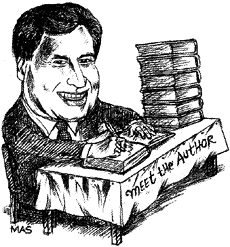Reviewers reviewed.

Book
Behind the Oval Office: Winning the Presidency in the Nineties, by Dick Morris (Random House). To hear the critics bash him, the former White House political adviser's entire life has been a dalliance with prostitution. As a professional, he was an amoral whore; as a husband and a public figure, he was done in by the thing itself; then there's Behind the Oval Office. "The book is priced at $25--one-eighth of prostitute Sherry Rowlands' hourly fee--and ... will give the author a chance to peddle his wares," notes Jennifer Harper in the Washington Times. Ad hominems are the order of the day. "Dick Morris's problems began early. Like the day he was born," says the Washington Post's Charlotte Hays. The book is said to have its uses, however. "It is a ... revealing book," says the Weekly Standard's Andrew Ferguson, though only unintentionally. Morris' descriptions of Clinton's temper tantrums, says Ferguson, make them sound like "the kind normally associated with autistic children--except in the president's case they are overlaid with self-righteousness and megalomania." The New York Times' Richard Bernstein is just about the book's only fan: "We owe it to Mr. Morris, whose book is lively, readable and anecdotally rich, for his insider's account of the way the game is played." (Jacob Weisberg skewers the book in Slate. Also, check out the Random House page for the book, which includes an excerpt.)
Movie
The Whole Wide World (Sony Pictures Classics). Critics see this biopic about Robert E. Howard, the author of the Conan the Barbarian stories, as an occasion to wax confessional, particularly on the subject of the writing life: "It's rare to see the basic conditions of a writer's existence--the solitude, the panic, the neediness, the unhealthy self-absorption--portrayed so starkly," says TheNew Yorker's Terrence Rafferty. The film "touches on things of the mind and of the heart: writing, cultural hunger in rural America, the roots of violence in art, the mystery of personality," says the Wall Street Journal's Joe Morgenstern. Not everyone is charmed. The Village Voice's Gary Dauphin complains that the film is mired in sentimental cutesiness: "I can dig the urge to know the man behind Conan's bulging biceps, but I don't know if Wide World's annoying, nutjob-cum-romantic-misfit take on the subject was what I, Howard, or the world really needed."

Event
The Inauguration of William Jefferson Clinton (Washington, D.C.). Expectations were low--second inaugurals are not supposed to top the first--but reviews are negative nonetheless. Rhetorically, the speech is deemed to have been unsuccessful. Presidential historian William Leuchtenburg was quoted by Todd Purdum in the New York Times as saying that it was the "most banal address by an American President I have ever heard." The problem, says Purdum, was that the president spent too much time "pouring over past Presidential speeches and anthologies of poetry." The upside was the speech's uncharacteristic brevity--22 minutes, according to NBC's Tom Brokaw. Reviews of inaugural pomp (appearances by celebrities Jessye Norman, Antonio Banderas, and Hootie and the Blowfish, as well as a parade) range from outrage at the "unseemly excess" (the Washington Post's Tom Shales) to boredom, though Norman's rendition of "Amazing Grace" was praised in the Post as "stirring." Television coverage struggled to make something out of nothing, says Shales: "Directors of live historical events appear to think they are making documentaries about the events rather than transmitting them into American homes." (For more reactions to the inaugural, see the "Dispatches" from Jacob Weisberg and Karenna Gore.)
Book
One World, Ready or Not: The Manic Logic of Global Capitalism, by William B. Greider (Simon & Schuster). The latest manifesto from the Rolling Stone editor (Who Will Tell the People?) condemns the globalization of markets and leads reviewers to reconsider their own enthusiasm for free trade. Greider brings "the global economic beast to life in all its splendor and horror" (Matthew Miller, in the New York Times). The passion of his polemic recalls Rousseau and Martin Luther (Walter Russell Mead, Foreign Affairs). But few are persuaded by Greider's conclusions. Critics have three main complaints: 1) his shoddy economics (see Paul Krugman in the Washington Post and in Slate); 2) his tired prescriptions--regulation, taxation, and protectionism; 3) his continued bashing of the Federal Reserve Board (a repetition of the theme of his 799-page Secrets of the Temple). "This is a book that graduate students and coffeehouse dissidents everywhere will enjoy," says Mead. (Also, see John Judis' favorable review in Slate.)
CD
Idomeneo, by Wolfgang Amadeus Mozart, performed by Placido Domingo and the Metropolitan Opera Orchestra and Chorus, conducted by James Levine (Deutsche Grammophon). Placido Domingo's appearance "on the package, compellingly photographed in costume as the ancient King of Crete," (Anthony Tommasini, the New York Times) is the main selling point for this new recording of one of Mozart's more obscure operas--a fact that does not make critics happy. "Mr. Domingo is no Mozartean," writes Tommasini. "He misses some of the lightness and agility demanded by florid passages." But reviewers agree that the recording succeeds--in spite of Domingo, and in spite of James Levine's "overblown conducting" (Alan Blyth, the Daily Telegraph)--mainly because of the cast, which includes soprano Cecilia Bartoli and Thomas Hampson. "[F]rom the moment Cecilia Bartoli's vibrant Idamante arrives on stage, the performance takes wing, her luscious, tight vibrato perfectly capturing the adolescent trauma of the young prince," says the Independent's Mark Pappenheim.
Movie
Albino Alligator (Miramax). Has the post-Tarrantino crime flick lost its charm? Reviews of the latest one suggest the answer is yes. Critics are unimpressed with first-time director (and Academy Award-winner) Kevin Spacey's attempts at stylishness, particularly the relentless allusions to film noir. The movie "reeks of film-student overkill" (Susan Wloszczyna, USA Today). It would only be allowed to "ooz[e] out of Miramax's storeroom" in the otherwise fallow month of January, says the Village Voice's Amy Taubin: "[I]ts devices are too shopworn to allow for a personal or original point of view." The New York Times' Janet Maslin says the film works precisely because it is derivative--its stars, Matt Dillon and Gary Sinise, emulate the characters in The UsualSuspects, which gives them "extraordinary opportunities to preen." (Miramax's site for Albino Alligator has video and stills.)
Television
The Naked Truth (NBC). ABC canceled this sitcom last year, but NBC revived it and put it in the slot after Seinfeld and before ER. Critics wonder whether the show can live up to its scheduling. Will its star, Tea Leoni (Flirting With Disaster), "blossom into this generation's Lucille Ball" (David Bianculli, the New York Daily News)? Are her comic skills on a par with her sex appeal? ("[W]hen she does a wobbly fall in a tight skirt and heels, it's like the moment in Bambi when the little deer fumbles and skitters across a patch of ice," says Ken Tucker in Entertainment Weekly.) Or is the show dreary and cliché-ridden? The New York Times' Caryn James calls the first episode "dangerously lame." Shales, in the Washington Post, says, "NBC has recycled garbage and gotten only new garbage in return." He suggests another title: The Ugly Truth. (NBC plugs the show at its site.)
Updates
In the New York Review of Books, Oxford Professor of Poetry James Fenton attacks The New Yorker's Adam Gopnik for attacking John Richardson's biography of Picasso and for attacking Picasso himself. "The man in the long skirt with the cloche hat, doling out these white feathers to artists of the past, and hitting them over the head with his parasol, is Adam Gopnik. ... As so often with Gopnik, the bad style leads the sense by the nose." ... In TheNew Yorker, Gary Wills, a classicist by training, praises Robert Fagles' translation of TheOdyssey ("Fagles is the best living translator of ancient Greek drama, lyric poetry, and epic into modern English, and [TheOdyssey] ... is his finest work so far"). He attributes its success to feminism or, more specifically, to "its entry into the psychological subtlety with which Homer presents women." ... The Weekly Standard's Philip Terzian on Walter Cronkite's memoirs: "Anyone tempted to romanticize the American people should be reminded that for nearly twenty years, 'the most trusted man in America' was a TV news reader with a mustache and mellifluous baritone named Walter Cronkite."... Despite the Golden Globes, Evita racks up more bad reviews. The New Republic's Stanley Kauffmann on Madonna: "She can sing, though there are too many times when she asks her country not to cry for her. She can't act."
Recent "Summary Judgment" columns:
Jan. 15:La Cérémonie (MK2 Productions/Prokino Filmproduktion); The Prospect Before Her: A History of Women in Western Europe, 1500-1800, by Olwen Hufton (Knopf); King of the Hill (Fox); and Tokyo International Forum (Ralph Viñoly, Japan).
Jan. 8:Beavis and Butt-Head Do America (Paramount); Slouching to Gomorrah: Modern Liberalism and American Decline, by Robert Bork (ReganBooks/HarperCollins); Politically Incorrect With Bill Maher (weeknights at 12:05 a.m. on ABC); Mother (Paramount Pictures); Some Mother's Son (Castle Rock); Christian Dior: The Man Who Made the World Look New, by Marie-France Pochna, translated by Joanna Savill (Arcade); and Yves Saint Laurent: A Biography, by Alice Rawsthorn (Nan A. Talese/Doubleday).
Jan. 1:Evita (Hollywood Pictures); Portrait of a Lady (Gramercy); Life of Picasso, Volume 2: 1907-1917, by John Richardson, with the collaboration of Marilyn McCully (Random House); Once Upon a Mattress (The Broadhurst Theatre on Broadway); Hamlet (Columbia); and The Odyssey, by Homer, translated by Robert Fagles (Viking).
Dec. 18:The People vs. Larry Flynt (Columbia Pictures); Marvin's Room (Miramax); The New Fowler's Modern English Usage, edited by R.W. Burchfield (Oxford University Press); A Reporter's Life, by Walter Cronkite (Knopf); Alias Grace, by Margaret Atwood (Nan A. Talese/Doubleday); and Whistle Down the Wind (National Theatre, Washington, D.C.).
--Compiled by Franklin Foer and the editors of Slate.
